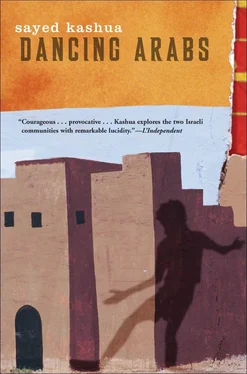Sometimes when I’m at home, I steal a few of my father’s books. I hate reading Arabic, but I owe it to myself to look at those books. To understand why Mahmoud Darwish is considered great, and why Emil Habibi was awarded the Israel Prize. The last book I stole was Hamarat al-Balad by Salman Natour. This young Arab — a poet, maybe, or an author — writes about life in a Tel Aviv pub. He describes all the left-wing Jews, who are really very nice to him. They listen to him with great interest and introduce him to new friends. Pretty young girls sit beside him and sometimes even kiss him. He recalls how at one stage he thought he could blend in completely. I feel like an idiot for ever thinking I could blend in too.
My father used to say I’d be the first Arab to build an atom bomb. He really believed it. Adel says no way. He used to think so too, but even if he were the smartest person in the world, they’d never let him study that kind of thing. There are some things an Arab can never become. The two of us were sitting in the guard’s room. We were alarm monitors that night. Every night since the Gulf War started two students had to stay up and wake the others if the alarm went off. Adel said he wanted to be the one to wake the girls because there were bound to be a few who slept in their underwear. The thought appealed to me, but I laughed at him anyway. In the drawer under his bed he had some girlie magazines. Sometimes, when there was nobody around, I’d lock the door and look through them, and all that time I’d think to myself, The guy’s a pervert.
The war was drawing to an end. There hadn’t been any alarms for several nights in a row, and Adel said there was still hope and the Iraqis might win. They were just waiting for the Americans to come closer. The Iraqis had enough oil to set the whole gulf on fire. All the aircraft carriers would be burned. The problem was that they didn’t have people who could think straight. If he’d been there, he’d have taught them how to win a war.
The uniformed guard in the glass booth across from us scared me. People in uniform always scared me. As far as I was concerned, all of them were police. I think he was a little scared of us too. Didn’t say a word, just sat there with a book in his hand as if he were trying to do his homework. Every now and then he’d peek at us, and as soon as he made eye contact he’d turn back to his book. I thought he was a student, but Adel said he must be making up some matriculation exams and looked like someone who’d never make it.
Just don’t let the alarm go off now. My parents have stopped wearing their gas masks, let alone staying in a sealed room. Mother told me that my father and brothers would go outdoors to see if there were any missiles in the air. They weren’t the only ones. Nobody in the village stayed indoors. People went out, to make sure the Patriot missiles weren’t working. Our neighbor started shouting for the missiles to come. It was as if he were trying to guide them past the Patriots. “Nooooo. … left … that’s right. Yeah!” His children applauded, and the women went lulululu the way they did at weddings.
The Arab newspapers wrote a story about a goat that could say “Sadaaaaaam.” Then people began seeing Saddam’s face in the moon. When I came home, my father couldn’t believe I didn’t see it myself. He took me outdoors and tried for hours to explain where I should look: where the nose was, where the mouth was, where the mustache was, and the beret. In the end, I did see him. It really did look like him. Not just like him — it was him. Look straight up.
When we were little, we used to fight over matzohs. They were like trick-or-treat candies that you can only get for a few weeks and then they disappear. The women didn’t need to bake during matzoh season. Everyone ate matzohs. With hummus, with salami, with beans, it was delicious. Grandma said the Jews kidnapped Dr. Jihad once, when he was still a little boy. His mother, a widow like my grandmother, cried all day. She looked for him all over Kfar Sava. She’d gone into a store to buy him an ice-cream bar, and he’d disappeared. Some men from the village joined her in the search. He was an only son, like my father. She almost died of grief, the poor woman. But eventually she found him. He was with some religious Jews, some rabbis, and they felt sorry for her and gave her back the child. They’d wanted to take some of his blood to put in their matzohs, my grandmother told us, but we didn’t believe that Dr. Jihad was ever little.
Sagi was the first boy to invite me to his home for the Passover seder. I had just started shaving my beard. They had a small apartment but a nice one, in a building with an elevator. There were no elevators in our village. The only ones we saw were at Meir hospital in Kfar Sava. He said I had nothing to worry about, that his parents were left-wingers. His mother was from South America and had been in the revolution. She was an ardent socialist. His father was from Poland, and I just had to see his pictures from when he was doing computer studies in the U.S. That was in the sixties, and he dressed like a flower child. There was a younger sister too, who played the piano in the living room, and in the kitchen they had a small television set on a swivel. They were nice to me. His mother kept smiling, good-natured. She cooked all day long. When she asked Sagi to bring some chairs from the neighbor, I helped him.
We weren’t close friends. Sometimes I’d borrow cassettes from him, because he liked hard rock and I wanted to learn what it sounded like. I didn’t particularly like the music, but he’d invited me, so I went. I had a hard time going home in those days. At some point in my adolescence it dawned on me that my parents hadn’t been treating me right.
Later that evening, an old man arrived, and another family with kids, including a girl our age. We sat to the side, and they sang. The girl held the Passover book and looked at the pictures and spoke a different language. She knew some of the songs, and sang them in a foreign accent, and seemed happy. She had just arrived in the country. A pretty girl.
That’s when I learned about Jewish holidays. You sit around a table, you dress up, you have wine, you don’t roast anything on a spit. And even if there are a lot of people, you don’t use disposable dishes. There’s no hummus on the table. You eat chopped liver and all sorts of strange foods. They were nice to me and didn’t put everything on my plate. They kept saying, “You don’t have to if you don’t like it.” But I ate it. If it’s good enough for them, it’s good enough for me.
Sagi taught me lots of things. About the Haggadah, and the afikomen, and the ten plagues of Egypt, and who Elijah the Prophet was. He dressed up as Elijah, and I kept looking at the girl, but it’s difficult to impress a girl when you don’t speak her language. She lived in an ulpan, where she was studying Hebrew. She’d just arrived in the country, and she’d come to stay. She said, “It’s a wonderful country,” and I had no idea what she was talking about. Just you wait, I thought. Just you wait till you see the Polanski kids. Just you wait till you have to take the bus. But she really was happy. Her parents had stayed in Argentina, but it didn’t matter to her, she said. She loved Eretz Yisrael.
We were sitting in Sagi’s room. I didn’t catch her name, and she didn’t catch mine. Sagi knew a little Spanish, and he translated what she said. “Ask her if there are any Arabs where she studies,” I said, and she said there weren’t any. “She says she’s heard about Arabs and she’s not afraid of them at all,” Sagi translated. And then he told her that there were Arabs at his school and that they were cool. She said she couldn’t understand how we even agreed to study there, and that in her opinion, there was no such thing as a good Arab. Sagi thought that was funny. He told me she was a stupid thick-headed jerk, a real cow. He grabbed his head, pointed at me, and said, “He’s an Arab.” She laughed and said it wasn’t nice to say such a thing about me.
Читать дальше












